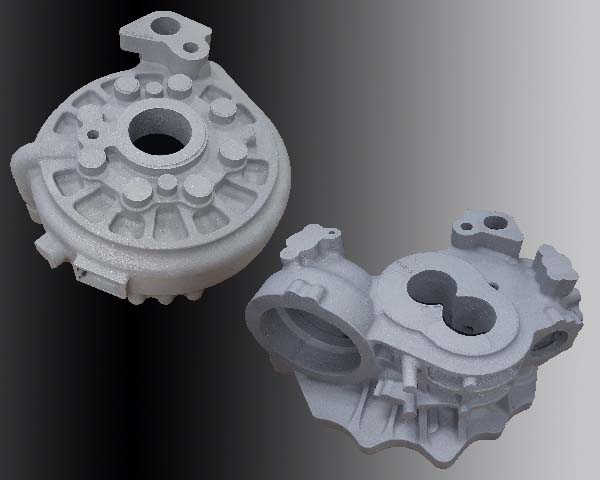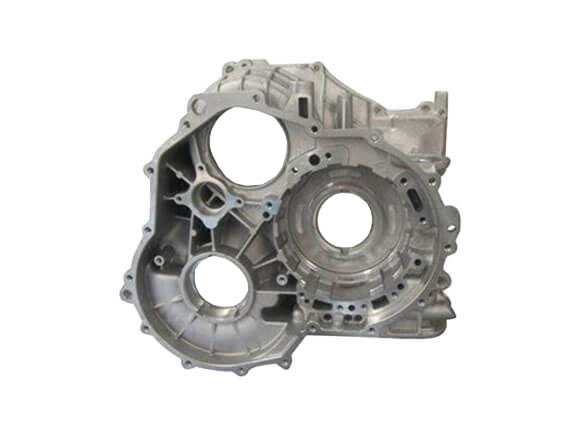The craftsmanship that makes aluminum casting a preferred production method
Checking out the Duty of Foundry Solutions beforehand Modern Engineering Solutions
Shop services are crucial in forming contemporary engineering services - aluminum casting. They connect the space between traditional manufacturing techniques and the needs of contemporary sectors. With improvements in automation and sustainability, foundries are advancing to satisfy the needs of markets such as aerospace and automobile. This improvement elevates inquiries regarding the implications for products, processes, and future advancements. What difficulties and opportunities exist ahead for foundry solutions in this quickly changing landscape?
The Evolution of Factory Services in Engineering

The combination of computer-aided layout (CAD) and simulation software program has reinvented the style and production procedures, enabling factories to create complicated geometries with greater accuracy. In addition, the shift towards environmentally friendly methods has resulted in the adoption of greener technologies and reusing initiatives within shops. As sectors significantly focus on modification and rapid prototyping, foundry solutions have expanded their capacities, ensuring they remain vital contributors to the design landscape. This development underscores the factory's critical duty in sustaining advancements across various industries, consisting of vehicle, aerospace, and power.
Trick Procedures and Techniques in Modern Foundries
Modern foundries use a selection of crucial processes and strategies that enhance the effectiveness and high quality of metal casting. Among these, sand spreading remains prevalent as a result of its versatility and cost-effectiveness. Making use of advanced technologies, such as computer-aided style (CAD) and computer-aided manufacturing (CAM), permits precise modeling and production, making sure high precision in component measurements. Furthermore, financial investment casting is favored for creating complicated geometries with excellent surface area coatings.
Automation and robotics improve production rate and consistency while lowering labor prices. Methods like additive production are increasingly integrated to create intricate molds and cores, consequently reducing product waste. The application of thermal analysis help in enhancing casting processes by managing and forecasting solidification behavior. Jointly, these processes and techniques exhibit exactly how modern foundries are adapting to satisfy the needs of contemporary design challenges, guaranteeing superior item quality and functional performance.
The Importance of Materials Option in Shop Solutions
Choosing the suitable materials is crucial in shop services, as it straight influences the mechanical homes, resilience, and overall performance of the final item. Various materials possess special characteristics, such as tensile strength, corrosion resistance, and thermal stability, which need to straighten with the intended application of the actors components. Metals like aluminum and steel are usually chosen for their strength-to-weight ratio, while alloys can improve specific performance attributes.
Additionally, the choice process entails considering factors such as manufacturability, expense, and availability, which can significantly impact project timelines and budget plans. In addition, innovations in material scientific research enable the advancement of cutting-edge composites and specialized alloys that accommodate emerging design challenges. A comprehensive understanding of product properties and their effects is vital for engineers and foundry experts to accomplish successful results in their projects. This mindful selection process inevitably enhances the reliability and effectiveness of the end items.
Foundry Services in Aerospace and Automotive Applications
Foundry solutions play an important function in the aerospace and auto sectors, where precision and performance are critical. These markets count heavily on the manufacturing of complicated components that need to fulfill extensive top quality criteria and stand up to extreme problems. Shops offer essential services such as spreading, machining, and ending up, making certain parts are light-weight yet robust, important for boosting gas effectiveness and safety and security.
In aerospace, foundry services add to the manufacturing of wind turbine blades, engine parts, and structural parts, all of which demand intricate styles and high-performance products. In the vehicle field, factories provide engine blocks, framework parts, and transmission cases, concentrating on sturdiness and weight decrease.
Advanced factory strategies, including additive manufacturing and accuracy spreading, are significantly employed to satisfy the specific requirements of these markets. By using customized solutions, foundry solutions assist drive technology and keep competitive benefits in the fast-evolving aerospace and auto landscapes.
Advancements Driven by Factory Capabilities
Various developments in engineering are fueled by the sophisticated capabilities of foundry solutions. These services allow the production of complicated geometries and high-performance materials that are important for modern applications. For example, additive production, frequently referred to as 3D printing, has actually seen substantial innovations with foundry methods, enabling learn the facts here now for the quick prototyping of intricate designs. Furthermore, the capacity to cast lightweight alloys has actually reinvented industries such as aerospace and automotive, bring about enhanced gas efficiency and performance.
Factories are increasingly integrating smart innovations, such as automation and data analytics, to improve production efficiency and high quality control. These developments not only minimize waste but additionally enable modification at scale, fulfilling the certain requirements of customers. By leveraging innovative shop capabilities, designers can check out new frontiers in item style and capability, eventually driving progress throughout various markets and establishing a structure for future developments.
Future Patterns in Factory Services and Design Solutions
The future of foundry solutions is shaped by emerging trends such as lasting production practices, which prioritize ecological responsibility. Automation and clever technologies are readied to enhance effectiveness and precision, while increasing personalization and flexibility will satisfy the progressing demands of clients. As these patterns progress, they will redefine the landscape of design solutions in the factory field.
Sustainable Manufacturing Practices
As industries significantly focus on ecological responsibility, lasting production methods within foundry services are coming to be important to modern-day engineering remedies. These techniques focus on lessening waste, reducing power usage, and using environment-friendly products throughout the production procedure. By carrying out techniques such as reusing scrap steel and optimizing melting procedures, foundries can significantly lower their carbon footprint. Additionally, the fostering of life cycle evaluations allows suppliers to evaluate the environmental effect of their products from creation to disposal. Working together with suppliers dedicated to sustainability better improves the efficiency of these efforts. Ultimately, accepting sustainable manufacturing not just aligns with international environmental objectives yet also promotes technology and competitiveness in the quickly advancing engineering landscape.
Automation and Smart Technologies
While lots of markets are welcoming technological advancements, shop services are experiencing a considerable change via automation and smart innovations. The integration of robotics and automated systems improves manufacturing effectiveness, lowers human mistake, and increases the manufacturing procedure. Smart modern technologies, such as IoT and AI, make it possible for real-time monitoring and predictive upkeep, which optimize operational efficiency and decrease downtime. These improvements promote click here now data-driven decision-making, enabling shops to respond quickly to market demands and improve item quality. In addition, automation minimizes labor prices and improves office security by managing harmful jobs. As factory services continue to adopt these developments, they are poised to redefine engineering remedies, leading to boosted competitiveness and sustainability in the manufacturing market.
Personalization and Flexibility Patterns
Arising fads in shop services significantly stress modification and adaptability to meet one-of-a-kind customer needs. This shift shows a more comprehensive need for tailored engineering remedies that adapt to specific project demands and market criteria. Firms are buying sophisticated innovations, such as additive production and electronic modeling, allowing them to produce tailored parts efficiently and cost-effectively. As an outcome, factories are relocating away from one-size-fits-all strategies, using clients the capability to modify styles and materials in real-time. Additionally, partnership between design groups and foundry services is coming to be more incorporated, fostering technology and speeding up time-to-market. This pattern not just boosts item efficiency but additionally sustains sustainability by minimizing waste with accurate production procedures.
Regularly Asked Inquiries
What Are the Common Prices Connected With Foundry Solutions?
Normal prices connected with foundry services consist of product expenses, labor fees, tools use costs, and overhead costs - aluminum casting. click for more info These expenses can differ extensively based on project intricacy, quantity, and particular needs of the design remedy included
The length of time Does the Shop Process Typically Take?
The foundry procedure normally takes anywhere from several weeks to a few months, depending upon aspects such as intricacy, product needs, and production volume, which can greatly influence timelines and general job distribution.
What Industries Advantage Many From Shop Solutions?
Industries such as auto, aerospace, and construction benefit significantly from foundry services. These industries count on accuracy spreading and steel manufacture to create complicated components, improving product performance and operational performance in their respective applications.
What Accreditations Should Shops Possess?
Factories ought to have qualifications such as ISO 9001 for high quality monitoring, ISO 14001 for environmental management, and certain market qualifications like AS9100 for aerospace or IATF 16949 for automotive, guaranteeing compliance and quality control.
Exactly How Do Foundries Make Sure High Quality Control in Their Procedures?

Shop services are necessary in shaping contemporary design services. As design techniques have progressed, the function of foundry solutions has changed substantially to meet developing market needs. As markets increasingly focus on customization and fast prototyping, factory services have expanded their abilities, ensuring they remain necessary contributors to the engineering landscape. As sectors significantly prioritize ecological duty, sustainable production methods within factory solutions are ending up being vital to contemporary design services. In addition, collaboration between design teams and factory solutions is becoming much more incorporated, promoting technology and increasing time-to-market.